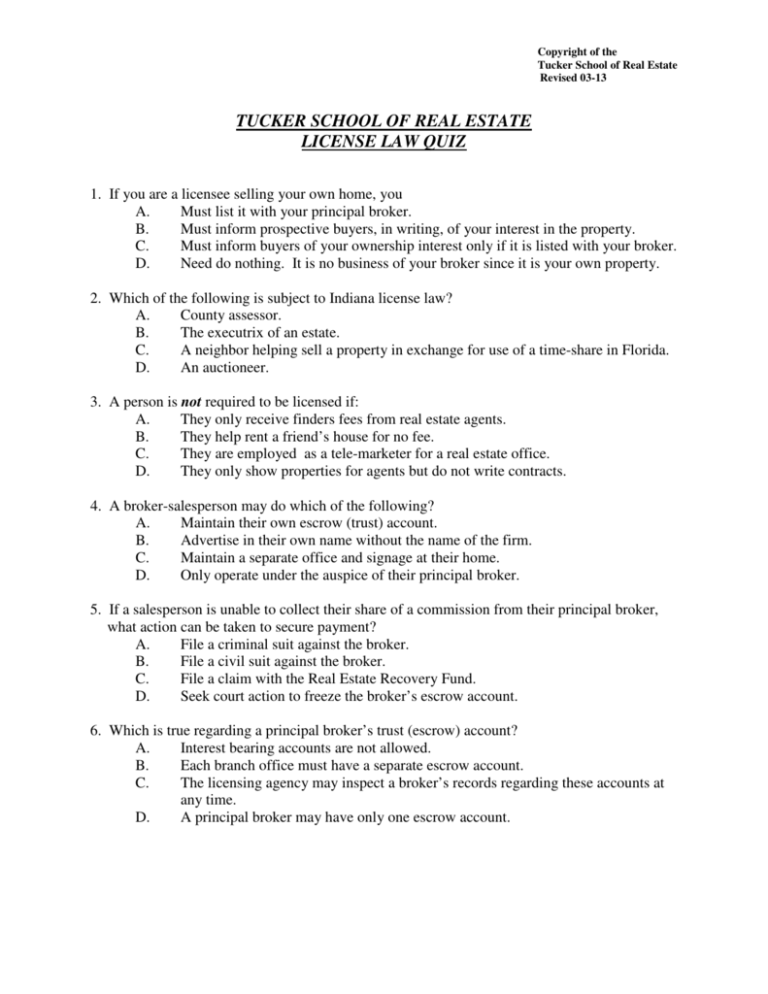
Real estate professionals in Pennsylvania must have a PA license. A number of courses and exams are required if your goal is to get your license. Find out more about the steps you will need to complete and the cost for obtaining your license.
First, you'll need to attend a course offered by a Pennsylvania-approved education provider. An online course can be taken to obtain your license. The standard real estate license process is broken up into three phases. Each phase usually takes one to two weeks.
The General Module is the first required course under law. The Commercial Module will be your second course. The exam that you'll be taking is the PA Real Estate Salesperson Exam. The test is divided into two sections and contains 110 questions. You'll be given 60 minutes to answer the Pennsylvania section and 120 minutes to complete the National portion of the test.

To pass the Pennsylvania Real Estate Salesperson Test, you will need to master key concepts and learn them. This is a simple enough task for most students, but it can be challenging for others. Online prep courses can be a great resource for students like you. A good course will provide you with everything you need to successfully pass the test. It will also help you identify the likely test questions to be asked on the exam.
The best way to prepare for the exam is to practice. Pop-up questions are available on the website. They will help you find the right answer but won't affect your grade. It's risk-free and a great way to prepare for the exam.
The company administering the state's licensure exams is called the PSI (Pennsylvania State Institute). It is intended to be challenging. It's not difficult to pass, however. You'll just need to put in the time and effort.
Preparing for the test can be a time-saving and labor-saving investment. Many schools provide proctoring for the final assessment. You can take your final exam even if you are unable to access a school campus or classroom.

Preparing for the Pennsylvania Real Estate Salesperson Exam is a good idea. It will also include the most important information before you take the exam. You'll also receive a glossary of key terms and definitions. These glossaries are also available as a PDF download so you can quickly review them.
A practice test is an essential part of any course. The PA Real Estate Salesperson Exam has a number of unanswered questions, so you'll want to make sure that you're ready for the test. Having a practice exam will ensure that you won't forget important points, and it will also help you reduce the amount of anxiety you have before the actual test.
FAQ
What should I do if I want to use a mortgage broker
A mortgage broker may be able to help you get a lower rate. Brokers have relationships with many lenders and can negotiate for your benefit. Some brokers receive a commission from lenders. Before signing up, you should verify all fees associated with the broker.
Is it possible fast to sell your house?
If you plan to move out of your current residence within the next few months, it may be possible to sell your house quickly. Before you sell your house, however, there are a few things that you should remember. First, you must find a buyer and make a contract. Second, you need to prepare your house for sale. Third, your property must be advertised. Finally, you should accept any offers made to your property.
Which is better, to rent or buy?
Renting is typically cheaper than buying your home. It is important to realize that renting is generally cheaper than buying a home. You will still need to pay utilities, repairs, and maintenance. A home purchase has many advantages. You will be able to have greater control over your life.
How much does it cost to replace windows?
Window replacement costs range from $1,500 to $3,000 per window. The cost to replace all your windows depends on their size, style and brand.
How can you tell if your house is worth selling?
It could be that your home has been priced incorrectly if you ask for a low asking price. If your asking price is significantly below the market value, there might not be enough interest. Get our free Home Value Report and learn more about the market.
What is a reverse mortgage?
A reverse mortgage is a way to borrow money from your home without having to put any equity into the property. It allows you access to your home equity and allow you to live there while drawing down money. There are two types of reverse mortgages: the government-insured FHA and the conventional. You must repay the amount borrowed and pay an origination fee for a conventional reverse loan. FHA insurance covers repayments.
Statistics
- 10 years ago, homeownership was nearly 70%. (fortunebuilders.com)
- This seems to be a more popular trend as the U.S. Census Bureau reports the homeownership rate was around 65% last year. (fortunebuilders.com)
- Private mortgage insurance may be required for conventional loans when the borrower puts less than 20% down.4 FHA loans are mortgage loans issued by private lenders and backed by the federal government. (investopedia.com)
- Over the past year, mortgage rates have hovered between 3.9 and 4.5 percent—a less significant increase. (fortunebuilders.com)
- The FHA sets its desirable debt-to-income ratio at 43%. (fortunebuilders.com)
External Links
How To
How do you find an apartment?
The first step in moving to a new location is to find an apartment. This requires planning and research. It includes finding the right neighborhood, researching neighborhoods, reading reviews, and making phone calls. You have many options. Some are more difficult than others. Before you rent an apartment, consider these steps.
-
It is possible to gather data offline and online when researching neighborhoods. Online resources include Yelp. Zillow. Trulia. Realtor.com. Local newspapers, landlords or friends of neighbors are some other offline sources.
-
Read reviews of the area you want to live in. Yelp. TripAdvisor. Amazon.com all have detailed reviews on houses and apartments. You might also be able to read local newspaper articles or visit your local library.
-
For more information, make phone calls and speak with people who have lived in the area. Ask them what the best and worst things about the area. Ask if they have any suggestions for great places to live.
-
Be aware of the rent rates in the areas where you are most interested. If you are concerned about how much you will spend on food, you might want to rent somewhere cheaper. You might also consider moving to a more luxurious location if entertainment is your main focus.
-
Find out more information about the apartment building you want to live in. How big is the apartment complex? What is the cost of it? Is it pet friendly What amenities is it equipped with? Do you need parking, or can you park nearby? Do tenants have to follow any rules?